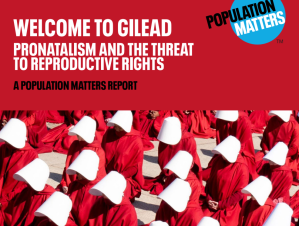We've defended reproductive rights from religiously motivated restrictions since our founding.
Religion should not stand in the way of reproductive healthcare.
A desire to restrict reproductive rights, and to control women's bodies, is a hallmark of religious fundamentalism. We strongly support the right of women to have legal and safe abortions and access to emergency contraception.
Since its founding the National Secular Society has supported reproductive rights. In 1878 our founder and vice-president were prosecuted for making information about birth control accessible to working class women.
Throughout the world, reproductive rights are still under threat from theocrats. While individual religious people hold diverse views on abortion, every stage of progress in reproductive healthcare has been fought by religious organisations. Often these have involved virulent campaigns of intimidation and misinformation.
84% of people in the UK believe abortion should be legal in all or most cases. This includes 76% of religious people and 94% of nonreligious people.
In the UK, emergency contraception can still sometimes be difficult to obtain. Some religious pharmacists have defied General Pharmaceutical Council guidance by refusing to sell it or even to dispense a prescription given to a woman after a consultation with her own doctor.
People of all religions and beliefs can have disagreements on the boundaries of bodily autonomy and reproductive rights. However, religious beliefs should not be used to restrict the bodily autonomy of other people.
Take action!
1. Share your story
Tell us why you support this campaign, and how you are personally affected by the issue. You can also let us know if you would like assistance with a particular issue.
2. Join the National Secular Society
Become a member of the National Secular Society today! Together, we can separate religion and state for greater freedom and fairness.
Latest updates
Don’t let religion undermine abortion access, NSS urges
Posted: Wed, 16 Feb 2022 11:13
The National Secular Society has warned the government that access to safe abortions should not be subject to a "religious veto".
The NSS has sought assurances from the secretary of state for health and social care that the decision over extending provisions to allow early medical abortions at home will not be "unduly influenced by those who ideologically oppose abortion and seek to make it harder for women to access abortion services".
In a letter to Sajid Javid, the NSS said religious ideology should not influence healthcare policies, "especially when appeasing 'pro-life' religious interest groups will undermine the health, safety and well-being of women".
In light of the pandemic, in 2020 the government enabled women to receive medication by post for abortions before 10 weeks' gestation, following a telephone consultation.
Last year the NSS backed proposals to make the 'pills by post' provisions permanent.
The NSS's letter follows an intervention from the Church of England calling for the provisions to be scrapped.
Mark Sheard, chairman of the Church's Mission and Public Affairs Council, said: "We shall expect the temporary provision to be removed by the end of March, if not sooner, and the bishop of Carlisle (the lead bishop for healthcare issues) has written accordingly to the Secretary of State for Health."
The Royal College of Obstetricians and Gynaecologists and the Faculty of Sexual and Reproductive Healthcare have concluded that any risks associated with the procedure are likely outweighed by the benefits of earlier, and therefore safer, abortions, in addition to more accessibility and patient choice as to the location of treatment.
According to the British Pregnancy Advice Service (BPAS), a record 86% of terminations were performed before 10 weeks' gestation in the first six months of 2020, which "minimises the risk of complications and ensures that no woman has to remain pregnant longer than necessary".
A study published last year, analysing the outcomes of more than 50,000 early medical abortions in England, Scotland and Wales between January and June 2020, found that 80 per cent of women said telemedicine was their preferred option and they would choose it in the future.
NSS chief executive Stephen Evans said: "Women's ability to safely access abortion should not subject to a religious veto.
"We therefore urge the government to ensure that the decision about whether to continue 'pills by post' for early medical abortion is not unduly influenced by those who opposes abortion in principle."
Image: fizkes/Shutterstock.com.
Report: Politicians use religion to restrict reproductive rights
Posted: Wed, 19 Jan 2022 09:10
Politicians around the world are using religion to restrict reproductive rights, a recent report has found.
Welcome to Gilead: pronatalism and the threat to reproductive rights (pictured) warns "extremist, religious, nationalist currents" leading to clampdowns on reproductive rights in countries like Poland are "spreading across the globe".
The report, published by Population Matters late last year, finds "governments and politicians now want women to have more children, and some are resorting to coercion to achieve that goal".
Nationalist politicians may be motivated by fears that low birth rates will result in a loss of national power, or that minority groups with higher fertility rates will 'erase' the culture of the existing ethnic or religious majority, the report says.
It says a wave of "Christian white nationalism" has swept across the formerly communist countries of Eastern Europe, and that politicians in the region have used the uncertainty of demographic change as an opportunity to increase support for their "nationalist, religion-infused politics" including anti-choice policies.
For example, in Poland extremist Catholic organisation Ordo luris has "bolstered" government claims that women are "selfishly choosing careers over their duty to preserve the nation through procreation". Education minister Przemysław Czarnek has said women should prioritise motherhood over careers because it is what "God called on them to do".
Additionally, the government hired an anti-contraception Catholic theologian to design Poland's new sex education curriculum, which mentions the word "sex" only twice, but the word "family" over 170 times.
Poland's clampdown on reproductive rights now means it ranks the lowest out of all countries in the European Parliamentary Forum for Sexual and Reproductive Rights' contraceptive policy atlas.
The report also highlights religion's role in restricting reproductive rights in Russia. In 2010, Russia's parliament established a working group including members of the Orthodox Church which aimed to decrease abortions. As a result of this political-religious collaboration, a 2012 law requires women who want an abortion to undergo counselling geared towards dissuading them from the procedure, which in many cases must take place with a priest.
Christian nationalists in the US have "strong" connections with their European counterparts, which the report says is partly due to the World Congress of Families (WCF) which was founded by right-wing American Christians and conservative Russians. WCF regularly holds gatherings for international followers on topics such as the "demographic winter" and "natural" family values.
The report also referenced the role of Islam in anti-choice policies. In Iran, prominent clerics have worried about low birth rates among the Shia Muslim population. Because Iran is governed by Shia clerics, maintaining a Shia majority is important for the regime's political future. In a 2013 speech, supreme leader of Iran Ali Khamenei said reproduction is "women's jihad", or religious duty. Recent reforms in Iran have cracked down on abortion and outlawed free birth control.
The report also details how ethno-nationalist policies have resulted in the oppression of religious minorities. For exampple, Uyghur Muslims in China have been subjected to forced abortions, sterilisations and long-term contraceptives as part of China's goal of "upgrading population quality".
The report recommends national and international policymakers "maintain absolute commitment to gender equality and all sexual and reproductive health and rights".
NSS head of policy and research Megan Manson said: "This report sheds important light on the alliances between hardline religious groups and nationalist governments which spell disaster for human rights and reproductive healthcare.
"It reveals religious institutions will all too readily lend their support to sinister policies designed to engineer desired populations at the cost of the rights and freedoms of women and minorities.
"International stakeholders must be unafraid to identify and call out the role of religion in these forms of oppression, and help to stop the trend of regressive anti-choice policymaking in its tracks."




